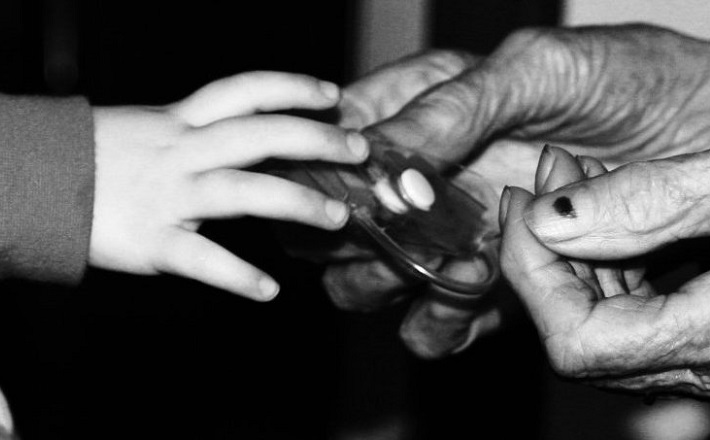Commentary on Jeremiah 11:18-20
I moved back to my home territory in 2015 after being away for forty years.
Around the same time, I started writing a regular column for my hometown newspaper in which I address religion, politics, and life in general. My perspectives and opinions sometimes surprise people who knew me way back when but didn’t keep up with me over the last four decades. Some folks seem surprised that my stances don’t align with the ones I espoused when I was eighteen or with the ones they held back then — and still do. A few people have expressed support and a few others some level of opposition or disappointment to things I’ve said. No one, so far as I know, has wanted to silence me by doing away with me.
Writing words for my hometown folks to read is a helpful exercise for me in the same way that preaching in the local churches I served as pastor over the years was: it reminds me that all preaching, whether through writing or speaking, is, as the late Speaker of the House Tip O’Neill said about politics, local. Preachers talk about matters that are national, global, and even cosmic in scope, but people near — and sometimes dear — to us hear and respond to them.
Jeremiah proclaimed a message with implications for all of Judah and for everyone in Jerusalem. Active during the last part of the seventh and early part of the sixth century BCE, he was witness to the Babylonian destruction of Jerusalem. He proclaimed the coming Babylonian invasion of Judah as God’s judgment and encouraged the people to submit to it. He paid a high price for such preaching.
We need to read all of Jeremiah 11 to experience the full power of the assigned reading. The Lord tells Jeremiah to preach to the people of Judah and Jerusalem about the covenant that had been in force for six centuries. The people had repeatedly proven unfaithful throughout Israel’s history. Now, continuing unfaithfulness to the covenant meant that judgment was coming.
The lectionary text focuses on threats Jeremiah is receiving because of his proclamation of God’s impending judgment against Judah and Jerusalem. The matter the prophet addresses is thus very personal. He is under attack to the point that his very life is at risk. We will benefit in our reading, though, from remembering that the final shaping of the book of Jeremiah took place during the Babylonian exile, so the book offers a message for God’s people as well as for God’s prophet.
Revelation (verse 18)
Taken in the context of Jeremiah 11, this sentence at first seems to be a continuation of what God has been saying to Jeremiah throughout the chapter. The people’s rebellion against God has gotten so bad and the judgment has become so inevitable, the Lord has even barred Jeremiah from interceding on the people’s behalf (Jeremiah 11:14).
In the two verses immediately preceding the present one, God says to the people of Judah and Jerusalem, “The Lord once called you, ‘A green olive tree, fair with goodly fruit’; but with the roar of a great tempest he will set fire to it, and its branches will be consumed. The Lord of hosts, who planted you, has pronounced evil against you, because of the evil that the house of Israel and the house of Judah have done, provoking me to anger by making offerings to Baal” (verses 16-17).
So at first glance, when Jeremiah says in Jeremiah 11:18, “It was the Lord who made it known to me, and I knew; then you showed me their evil deeds,” it seems that “evil deeds” refers to the rebellion that God has addressed throughout the chapter to this point.
Realization (verse 19)
It turns out, though, that some of the people’s evil deeds are directed at Jeremiah personally. This news takes the prophet by surprise. His assertion that he “was like a gentle lamb led to the slaughter” seems to be explained by his further statement, “And I did not know it was against me that they devised schemes…” Jeremiah emphasizes his unawareness of people’s plots against him. Earlier in the chapter, God told Jeremiah, “Conspiracy exists among the people of Judah and the inhabitants of Jerusalem” (Jeremiah 11:9).
The Lord goes on to describe that conspiracy as involving turning away from the covenant and to other gods. Now Jeremiah learns that people are also conspiring against him. The specific plot against the Lord’s prophet is part of the general conspiracy against the Lord.
The people’s plot against Jeremiah seeks a devastating outcome. “Let us destroy the tree with its fruit, let us cut him off from the land of the living, so that his name will no longer be remembered!” implies a total elimination of Jeremiah’s life and legacy.
The truly shocking news that the Lord reveals to Jeremiah is that those out to get him are residents of his hometown of Anathoth (Jeremiah 11:21-23). Jesus was hardly the first prophet to find no honor in his hometown (Mark 6:4). Still, it is particularly painful to learn that those who have known you the longest are your harshest critics and most committed opponents.
Resolution (verse 20)
Jeremiah 11:18-20 contains one of Jeremiah’s many laments. We will profit from reading the others and from reading some of the laments in the Psalms. Interestingly, Leslie Allen points out that the text has elements of a psalm of thanksgiving;1 Jeremiah is grateful that God has let him know of the threat against him. But what God has notified him of is cause for lament.
This closing verse of our passage is typical of laments. Jeremiah has “committed [his] cause” to the Lord, and he asks God to bring justice to those who want to destroy him. It is important to note a couple of things. First, Jeremiah leaves judgment in God’s hands and doesn’t try to execute it himself.2 Second, keeping in mind the canonical shaping of the book of Jeremiah, this becomes a prayer of God’s people, who trust that God is working God’s purposes out and will do justice. We might keep in mind also that Jeremiah was certain he was in the right, and history has revealed that to be the case. We should take care in making such assumptions. But we can trust God to do true justice in the long run.
Notes:
- Leslie C. Allen, Jeremiah, The Old Testament Library (Louisville KY: Westminster John Knox, 2008), 146.
- Terence E. Fretheim, Jeremiah, Smyth & Helwys Bible Commentary (Macon GA: Smyth & Helwys, 2002), 190.


September 23, 2018